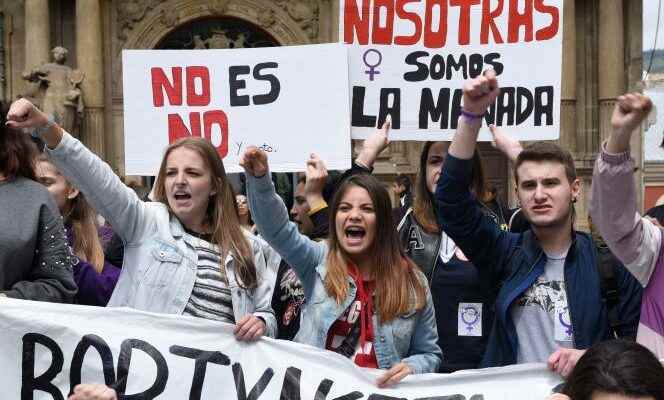Any sexual act without explicit consent is now recognized as rape. Spain strengthened, Thursday, August 25, its legislation against sexual violence by introducing the obligation of an explicit agreement, a measure still in the minority in Europe. Nicknamed “Only a yes is a yes”this text, which officially bears the title of “law of integral guarantee of sexual freedom”was finally approved Thursday by the deputies by 205 votes against 141 and three abstentions.
“Our country finally enshrines in its law that consent must be the central element of our sexual relations. Women will no longer have to show that there was violence or intimidation during an assault for it to be recognized as a sexual assault”rejoiced the Minister for Equality, Irene Montero, of the radical left party Podemos, a minority ally of the Socialists in the government.
The text had been approved by the Lower House of Parliament in first reading in May. However, the Senate had introduced a modification in July which made it necessary to vote again by the deputies.
The reform of the Penal Code demanded
Until now, the notion of violence or intimidation was necessary to qualify a rape in Spain. This question had been at the heart of the so-called “La Meute” case, the gang rape in 2016 of an 18-year-old young woman during the San Fermin celebrations in Pamplona (north) by five men who had filmed their acts. and bragged about it on a messaging group.
They had been sentenced in 2018 to nine years in prison, not for rape, but for “sexual abuse” which is a misdemeanor and not a felony. This leads, as a result, to less severe penalties. This situation disappears with the new law.
At the time of the trial, the sentence had brought tens of thousands of women to the streets across Spain, to cries of “I believe you, my sister”to demand a strengthening of the penal code.
Faced with these indignant reactions, the Spanish Supreme Court finally reclassified the facts in June 2019 as “gathering rape” and increased the sentences to fifteen years in prison. The government of socialist Pedro Sánchez had, for its part, promised to pass a law on explicit consent, as soon as it came to power in June 2018.
Swedish influence
This law also targets street harassment even more, develops affective and sexual education at school and increases attention to victims of sexual violence and their compensation. On the question of consent, the government says it has taken direct inspiration from the Istanbul Convention of the Council of Europe, an international treaty adopted in 2011 and establishing rules to combat gender-based and sexual violence. The Minister for Equality also indicated that Spain had been influenced by a Swedish law which considers, since 2018, as rape any sexual act without explicit agreement.
In Europe, the notion of explicit consent remains in the minority. According to a study by Amnesty International dating from the end of 2020, twelve European countries – including Belgium, Denmark, Sweden and the United Kingdom – out of the thirty-one analyzed by the NGO then defined rape as from the absence of consent, beyond coercion or vulnerability.
Among these countries, Germany strengthened its legislation in 2017 to make the absence of consent the sole criterion for defining rape. In France, a law aimed at protecting minors from sexual crimes and offenses as well as incest last year set the consent threshold at 15, and 18 in the case of incest.
Spain has been a reference in the field of the fight against sexual violence since a pioneering law in 2004, which notably introduced gender difference as an aggravating circumstance of violence.
